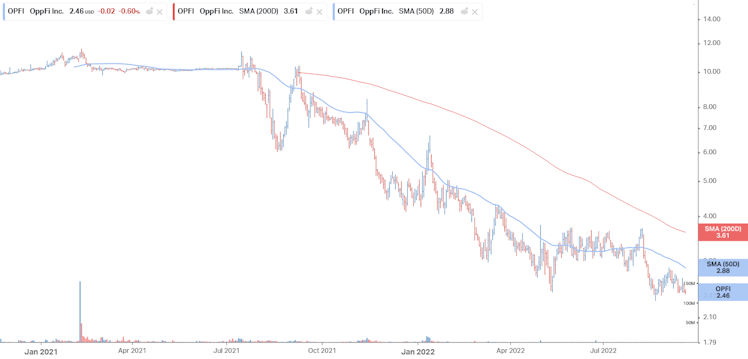Trending Assets
Top investors this month
Trending Assets
Top investors this month
$OPFI - An Expensive Lesson in "Value" Investing
I have been trimming my position in OppFi ($OPFI) since this summer, given that my shares are now eligible to be written off as a capital loss. The journey as an OppFi shareholder has been treacherous and exhausting - an experience I wouldn't wish upon anyone. Then again, as a young investor, I'm thankful for the lessons that I have been able to take away from this mistake. I thought I'd share some with you all below:
1) If something is "cheap", it doesn't make it a good investment
Last summer, I ran a comparable analysis model on OppFi relative to other fintechs, noticing they traded between 4-6x Forward Sales while peers traded >10x forward. Without taking into account why this dispersion existed, this dynamic drove the crux of my investment thesis. Looking back now, it didn't make sense that names like Upstart ($UPST), SoFi ($SOFI), and Affirm ($AFRM) traded north of 20x forward sales. These names have since fallen from grace, hinting that the FinTech sector en masse was extremely overvalued last summer. Markets can move quickly - and if something is materially "cheaper" relative to its peers, it is not without reason.
2) Do the Work!
In hindsight, it is apparent to me that I did not thoroughly diligence the name as much as I should've. The comparable businesses listed above were barely analogous to OppFi, who had only recently changed its name from OppLoans. Indeed, OppFi was a legacy subprime lender masquerading as a cutting-edge consumer lending app. This was a lapse in my own research process. Instead of reading through merger documents and other SEC filings, I listened to podcasts featuring the SPAC's sponsors, the company's CEO, and others related to the deal. While I enjoyed these podcasts and certainly don't blame the hosts for interviewing these guests, it was clear that I was hearing a biased perspective from management and was perhaps getting too caught up in the promotional element of the SPAC process. Had I gone through the SEC filings, I likely would've identified the company's urgency in completing such a transaction and understood why the redemption price was higher than the issuing price. These ultimately would become harbingers for what turned out to be a horrible de-SPACing process.

3) Doubling Down
The most expensive mistake I made in my OppFi experience was doubling down after the company had shed 30-40% off their share price. Curiously, the company's shares ripped back up to $10 nearly a month or two following the de-SPAC process, giving me (and perhaps other investors) false hope in OppFi's resilience amidst a SPAC downturn. The unfortunate reality is that OppFi was coming off of a record year and was unlikely to repeat the success found in '19-'20. On top of that, the management team was revealed to be unprepared for the reporting cadence of public markets, cycling through two CEOs within 6 months of the de-SPAC process. Regardless, I rationalized my investment, believing that the price of the company was ultimately driving the narrative, as opposed to the other way around. The reality was that OppFi was overvalued and the company failed to meet specific operational targets - a deadly sin in the world of public markets.
All in all, I still own a small sliver of OppFi, but aim to dump those shares as soon as they're eligible for long-term losses. I have no hard feelings towards anyone on the OppFi team, nor anyone from FG Financial Group (the sponsor). To those still invested, or who wish to invest, I bid you luck and hope you can avoid some of the same mistakes that I did. Happy investing!
Already have an account?